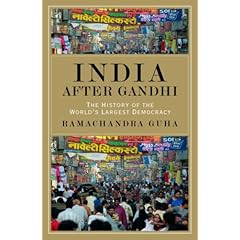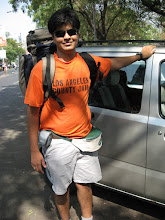
At first i was sceptical of picking up this book, as i wasn't sure of the author.
I had seen Ramachandra Guha mostly of NDTV Big Fight; nothing beyond that.
A bit sceptical at first ; I picked the book anyways.
One of the first things i noticed is that the author had done extensive research; he knows what he is talking about.
So What is this book about anyways ?
As the title mentions its About India after Independence, after Gandhi.
As Guha has rightly pointed out, in schools history ends with our independence.
It may extend uptil Liberation of Hyderabad and Goa, but nothing beyond that.
Also the history i have read during school were prejudiced towards the Indian Government.
Well in the end who publishes those books.
Coming back to the main point, History for us in true sense begins after Independence.
1950s-60s were infact one of the most tumultuous periods of Free India and what most of the pages of the book talk about.
There were many issues Kashmir Independence, Naga problem, Reorganization of states based on Languages, Demands for New states,The wars against Pakistan and China,Famines/ Rise of Naxalites, Refugees inflow from Bangladesh[ formerly East Pakistan] etc etc.
We are taken through all these times and gives views of what Nehru, Vallabhbhai Patel and Other Eminent leaders thought and did. There is also views/opinions expressed by foreign media/reporters.
This really is very insightful into understanding how the nation has shaped up after some many years and also understanding views of other countries.
One of the points i personally really appreciate about Guha is that he never tries to provide his judgement/views because as he says, which is rightly so that he wasn't there then and neither is he an expert in state-affairs.
Also, standing out is the author's unbiased attitude. This is true, especially when it comes to the Kashmir Issue.
In the books/articles that i have read ,there is always a bias ;either criticizing the Indian Government or praising it.
There is never a part in the book, where there is either repetition or of being monotonous.
Towards the end, there is nice small chapter dedicated to Indian Entertainment which is obviously Movies and Sports, how that also influences our culture.
I would surely recommend this book to everyone who has prejudices regarding India and our past leaders.
Thursday, December 13, 2007
India After Gandhi .
Subscribe to:
Post Comments (Atom)




2 comments:
Hey, thanks for the nice review! So since guha does not express his opinion for or against any decision that was taken or any event, does the book really make you think enough? And do you think the title of the book is justified ? Coz, the impression I get on hearing the title is - maybe the book presents a contrast of the India that has emerged from the time of independence and the contrast it is to what Gandhi had imagined it would be (or rather would have liked it to be). From what you said , the book might as well have named 'India After Independence'. Thoughts?
Anywaz, am sure to pick this one up! Thanks!
Yeah what you say is partially true.
India after Gandhi could well have been India after Independence.
But there are places where he does mention what Gandhi thought and what happened.
The book is not a retrospective one to make you think about what should have been the course of action, but surely makes a good food for thought.
Post a Comment